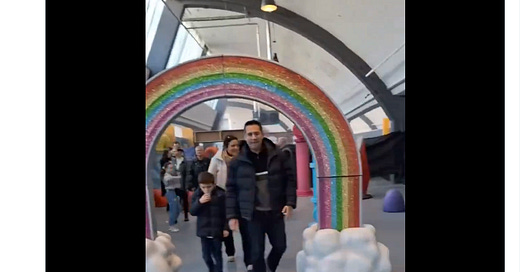Borkowski Media Trends: Glasgow Wonka Experience & MORE
PLUS: Royals' Kate Update Vacuum | BBC's Huw Climbdown
Oompa, Loompa, doompa-dee-d’oh
Wonka’s not welcome back in Glasgow
Such has been the international fervour around the Glasgow Wonka fiasco that it’s hard to capture its essence in mere words.
A Willy Wonka-themed immersive experience in Glasgow charging £35 for tickets was revealed to be a warehouse sparsely littered with cheap props, in which bewildered actors used meagre rations of jelly beans to shepherd disillusioned children and their increasingly furious parents through a baffling AI-generated storyline featuring a character called ‘The Unknown’ described as an ‘evil chocolate maker’.
It’s one of these rare viral phenomena from which practically nobody benefits other than the media outlets and social accounts whose views went through the roof and the general public who as a collective are simply sore from laughing.
The sheer cartoonish trashbag audacity of the scam has been compared to It’s Always Sunny in Philadelphia often enough for the show’s creator to acknowledge the comparison and could explain its morbid fascination amongst the terminally online.
Individual images of a dismayed Oompa Loompa in what appears to be a meth lab and, of course, now-iconic villain The Unknown have also served as meme fodder and even been recreated in video games.
Understandably a couple of the actors involved have tried to use the undeniably excellent anecdote of their involvement in the catastrophe to secure their 15 minutes of fame, but they are amongst the only beneficiaries.
The organisers’ problems could be severe enough to be potentially legal rather than reputational, the ticket buyers fooled by the ludicrous AI-generated marketing for the event have not drawn enough sympathy to drown out the derisive laughter, and the ‘immersive’ industry, which produces some boundary-pushing work, but the fringes of which have long been criticised as easy game for opportunistic charlatans, now has another troubling case study.
Internet Fills Royals’ Kate Update Vacuum
The internet was awash this week with theories as to the whereabouts of the Princess of Wales, who hasn’t been seen in public since late December. While January’s announcement that she would be stepping back from royal duties until after Easter seemed to quell initial public interest, the recent and continued silence has left in its wake the gurgling roar of social media conspiracy. This has ranged from the sublime (Kate is an Oompa-Loompa at the Glasgow Willy Wonka Experience), to the ridiculous (Kate has undergone significant plastic surgery, Ash Wednesday-style), to the uncomfortable (divorce rumours).
Although it seems clear that the Princess is simply ill and taking the necessary time out to recover, the Palace’s initial silence on it allowed those theories to spread and multiply, an information vacuum filled by both offhanded memes and potentially harmful rumour. We’ve discussed before how the modern royals have deviated from the old motto of “never complain, never explain”, a change informed by the impact of Princess Diana’s death on both her children and the Palace itself. But it’s also the case that royal speculation as a public hobby is now as influential as the once exclusive royal media cottage industry. That speculation can, of course, be damaging, but so can a kneejerk response to it – one only has to look as far as Prince Andrew’s infamous Newsnight interview for that.
The Palace ultimately issued a perhaps rightfully snippy statement to Page Six, reiterating that only “significant” updates would be shared on her health. The amplification of those conspiracies via social media arguably forced their hand, but in clarifying, again, that they will share nothing further, it underlines the core truth: while she may be a public figure, the Princess of Wales is as entitled to her recovery time as anyone else.
BBC’s Painful Edwards Climbdown
With social media ablaze over the Glasgow Wonka experience and Kate Middleton/Prince William conspiracy theories, it’s an interesting time to reassess the rapid virality of last year’s Huw Edwards scandal, after the BBC apologised for how it handled the initial complaint.
The story dominated TikTok and Twitter with help from The Sun, which first reported that the unnamed presenter paid a young person for sexually explicit photos. It was a saga-turned-witch-hunt that spread across the BBC, with many other presenters, including Jeremy Vine and Faisal Islam, facing baseless allegations stemming from a complaint and inadequate processes to manage the crisis.
The BBC’s apology comes with the announcement that its independent report, handled by Deloitte and various senior BBC figures, has concluded and will result in a restructure of the complaints handling procedure. It’s a dry and robust report reflecting how the BBC has dealt with the news itself - sticking to detail that has now been swallowed by a hectic news cycle.
It is a pertinent reminder of how these crises can turn from a single complaint to a media barrage thanks to the complex web that is our current media landscape. Especially when traditional media and social media sync up to create a many-headed- monster that often devours any shred of truth.
The drama caused by ‘the unnamed presenters’ actions was fuelled by how few facts we had about the story, putting the BBC on the back foot when it broke, unable to respond to the ferocity and pace of its developments. Perhaps another example of the BBC’s modern woes is the persistence of processes that critically need to adapt to an age where a crisis disseminating on social media requires a rapid response and a thoughtful approach, which the report must address for the BBC’s sake.







